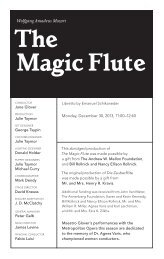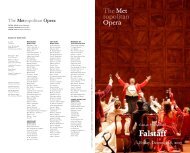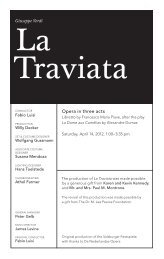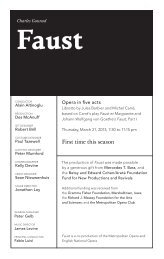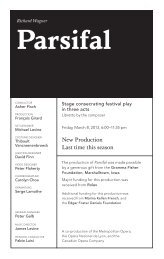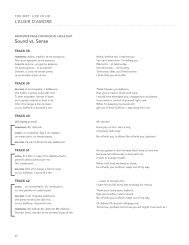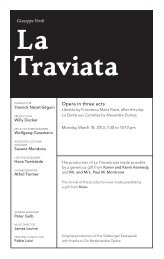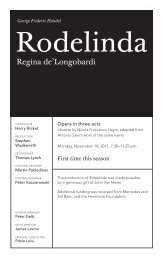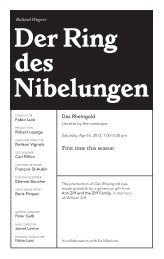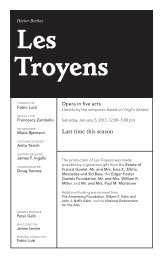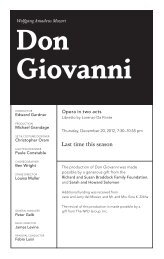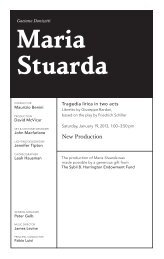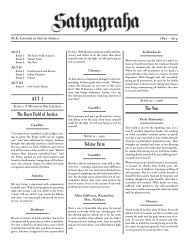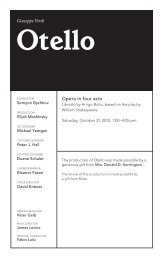Don Giovanni - Metropolitan Opera
Don Giovanni - Metropolitan Opera
Don Giovanni - Metropolitan Opera
You also want an ePaper? Increase the reach of your titles
YUMPU automatically turns print PDFs into web optimized ePapers that Google loves.
Wolfgang Amadeus Mozart<br />
<strong>Don</strong><br />
<strong>Giovanni</strong><br />
CONDUCTOR<br />
Andrew Davis<br />
PRODUCTION<br />
Michael Grandage<br />
SET & COSTUME DESIGNER<br />
Christopher Oram<br />
LIGHTING DESIGNER<br />
Paule Constable<br />
CHOREOGRAPHER<br />
Ben Wright<br />
GENERAL MANAGER<br />
Peter Gelb<br />
MUSIC DIRECTOR<br />
James Levine<br />
PRINCIPAL CONDUCTOR<br />
Fabio Luisi<br />
<strong>Opera</strong> in two acts<br />
Libretto by Lorenzo Da Ponte<br />
Wednesday, March 7, 2012, 7:30–11:00 pm<br />
New Production<br />
The production of <strong>Don</strong> <strong>Giovanni</strong> was made<br />
possible by generous gifts from the<br />
Richard and Susan Braddock Family Foundation,<br />
and Sarah and Howard Solomon.<br />
Additional funding was received from<br />
Jane and Jerry del Missier, and Mr. and Mrs. Ezra K. Zilkha.
2011–2012 Season<br />
The 528th <strong>Metropolitan</strong> <strong>Opera</strong> performance of<br />
Wolfgang Amadeus Mozart’s<br />
<strong>Don</strong><br />
<strong>Giovanni</strong><br />
Conductor<br />
Andrew Davis<br />
IN ORDER OF VOCAL APPEARANCE<br />
Leporello<br />
Bryn Terfel<br />
<strong>Don</strong>na Anna<br />
Marina Rebeka<br />
<strong>Don</strong> <strong>Giovanni</strong><br />
Gerald Finley<br />
The Commendatore<br />
James Morris<br />
<strong>Don</strong> Ottavio<br />
Matthew Polenzani<br />
<strong>Don</strong>na Elvira<br />
Ellie Dehn<br />
Zerlina<br />
Isabel Leonard<br />
Masetto<br />
Shenyang*<br />
HARPSICHORD CONTINUO<br />
Howard Watkins<br />
MANDOLIN SOLO<br />
Joyce Rasmussen Balint<br />
Wednesday, March 7, 2012, 7:30–11:00 pm
A scene from Mozart’s<br />
<strong>Don</strong> <strong>Giovanni</strong><br />
Yamaha is the official piano<br />
of the <strong>Metropolitan</strong> <strong>Opera</strong>.<br />
Latecomers will not be<br />
admitted during the<br />
performance.<br />
* Graduate of the<br />
Lindemann Young Artist<br />
Development Program<br />
Visit metopera.org<br />
Chorus Master <strong>Don</strong>ald Palumbo<br />
Musical Preparation Dennis Giauque, <strong>Don</strong>na Racik,<br />
Joseph Colaneri, and Howard Watkins<br />
Fight Director Nigel Poulton<br />
Assistant Stage Directors Gregory Anthony Fortner,<br />
Sarah Ina Meyers, and Louisa Muller<br />
Stage Band Conductor Jeffrey Goldberg<br />
Italian Coach Hemdi Kfir<br />
Prompter <strong>Don</strong>na Racik<br />
Met Titles Cori Ellison<br />
Scenery, properties, and electrical props constructed and<br />
painted in <strong>Metropolitan</strong> <strong>Opera</strong> Shops<br />
Costumes executed by <strong>Metropolitan</strong> <strong>Opera</strong> Costume<br />
Shop, Stephanie Arditti, and Anna Watkins, London<br />
Wigs by <strong>Metropolitan</strong> <strong>Opera</strong> Wig Department<br />
This performance is made possible in part by public funds<br />
from the New York State Council on the Arts.<br />
This production uses fire effects.<br />
Before the performance begins, please switch off cell<br />
phones and other electronic devices.<br />
Met Titles<br />
To activate, press the red button to the right of the screen in front of your<br />
seat and follow the instructions provided. To turn off the display, press<br />
the red button once again. If you have questions please ask an usher at<br />
intermission.<br />
Marty Sohl/<strong>Metropolitan</strong> <strong>Opera</strong>
34<br />
Synopsis<br />
Spain, mid-18th century<br />
Act I<br />
scene 1 The Commendatore’s home<br />
scene 2 A street<br />
scene 3 Open country near <strong>Don</strong> <strong>Giovanni</strong>’s home<br />
scene 4 Outside <strong>Don</strong> <strong>Giovanni</strong>’s home<br />
scene 5 Inside <strong>Don</strong> <strong>Giovanni</strong>’s home<br />
Intermission (AT APPROXIMATELY 9:05 PM)<br />
Act II<br />
scene 1 A street<br />
scene 2 A courtyard in front of the Commendatore’s home<br />
scene 3 A cemetery<br />
scene 4 Another part of the Commendatore’s home<br />
scene 5 <strong>Don</strong> <strong>Giovanni</strong>’s home<br />
Act I<br />
Leporello, servant to the nobleman <strong>Don</strong> <strong>Giovanni</strong>, keeps watch outside the<br />
Commendatore’s home at night. Suddenly, the Commendatore’s daughter,<br />
<strong>Don</strong>na Anna, rushes out, struggling with the masked <strong>Giovanni</strong> and followed<br />
by her father. The Commendatore challenges <strong>Giovanni</strong> to a duel and is killed.<br />
<strong>Giovanni</strong> and Leporello escape. Anna asks her fiancé, <strong>Don</strong> Ottavio, to avenge<br />
her father’s death.<br />
In the morning, <strong>Giovanni</strong> and Leporello encounter one of <strong>Giovanni</strong>’s former<br />
conquests, <strong>Don</strong>na Elvira, who is devastated by his betrayal. Leporello tells her<br />
she is neither the first nor the last woman to fall victim to <strong>Giovanni</strong> and shows her<br />
his catalogue with the name of every woman <strong>Giovanni</strong> has seduced.<br />
Peasants celebrate the marriage of Masetto and Zerlina. <strong>Giovanni</strong> flirts with<br />
the bride, telling her she is destined for a better life. But Elvira tells Zerlina to<br />
flee her suitor. She also warns Anna, who is still unaware of the identity of her<br />
father’s murderer and has asked <strong>Giovanni</strong> for help in finding the man. <strong>Giovanni</strong>,<br />
for his part, insists that Elvira is mad, and Anna and Ottavio wonder what to<br />
believe. As <strong>Giovanni</strong> leaves, Anna suddenly recognizes his voice as that of the<br />
murderer. Devastated but determined, she once more asks Ottavio to avenge<br />
her. He wonders how to restore her peace of mind. <strong>Giovanni</strong>, who has invited<br />
the entire wedding party to his home, looks forward to an evening of drinking<br />
and dancing.
Outside <strong>Giovanni</strong>’s home, Zerlina asks Masetto to forgive her. <strong>Giovanni</strong> enters<br />
and leads them both inside. Anna, Elvira, and Ottavio appear masked and are<br />
invited in by Leporello. In the ballroom, <strong>Giovanni</strong> dances with Zerlina, then tries<br />
to drag her into the adjoining room. When she cries for help, <strong>Giovanni</strong> blames<br />
Leporello. Anna, Elvira, and Ottavio take off their masks and, along with Zerlina<br />
and Masetto, accuse <strong>Giovanni</strong>, who is momentarily surprised but manages to<br />
slip away.<br />
Act II<br />
Having exchanged clothes with <strong>Giovanni</strong>, Leporello takes Elvira on a nighttime<br />
walk, leaving his master free to serenade her maid. When Masetto arrives with a<br />
band of peasants to hunt down <strong>Giovanni</strong>, the disguised <strong>Don</strong> sends them off in<br />
various directions, then beats up Masetto. Zerlina finds her bruised fiancé and<br />
comforts him.<br />
Later that night, Leporello—still believed by Elvira to be <strong>Giovanni</strong>—is surprised<br />
by Anna, Ottavio, Zerlina, and Masetto, who all denounce the supposed <strong>Don</strong>.<br />
Fearing for his life, Leporello reveals his true identity before making his escape.<br />
Ottavio proclaims that he will take revenge on <strong>Giovanni</strong> and asks the others to<br />
look after Anna. Elvira thinks about <strong>Giovanni</strong>, whom she still loves in spite of<br />
everything.<br />
In a cemetery, <strong>Giovanni</strong> and Leporello meet the statue of the Commendatore,<br />
who warns <strong>Giovanni</strong> that by morning he will laugh no longer. <strong>Giovanni</strong> forces the<br />
terrified Leporello to invite the statue to dinner. The statue accepts.<br />
Once again, Ottavio asks Anna to marry him, but she replies that she will not<br />
until her father’s death has been avenged.<br />
Elvira arrives at <strong>Giovanni</strong>’s home. She makes a last desperate attempt to<br />
persuade him to change his life, but he only laughs at her. The figure of the<br />
Commendatore enters and asks <strong>Giovanni</strong> to repent. When he boldly refuses he<br />
is consumed by flames. Elvira, Anna, Ottavio, Zerlina, Masetto, and Leporello<br />
appear, contemplating their futures and the fate of an immoral man.<br />
Visit metopera.org<br />
35
36<br />
In Focus<br />
Wolfgang Amadeus Mozart<br />
<strong>Don</strong> <strong>Giovanni</strong><br />
Premiere: National Theater (now Estates Theater), Prague, 1787<br />
Aided by his ingenious librettist, Lorenzo Da Ponte, Mozart approached his<br />
operatic retelling of the <strong>Don</strong> Juan myth from a point of view that is neither tragic<br />
nor entirely comic, but rather lighthearted, urbane, and ironic. Over the course<br />
of a night, a day, and another night, we follow the title character and his earthy<br />
comic sidekick, Leporello, through a series of encounters that begins with a fatal<br />
duel, moves back and forth between the humorous and the sentimental, and<br />
ends with the protagonist being dragged down to hell by a vengeful, ghostly<br />
reincarnation of the Commendatore. Buoyed by Mozart’s nuanced and insightful<br />
score, the opera still rings with psychological truth after more than two centuries.<br />
The Creators<br />
Wolfgang Amadeus Mozart (1756–1791) was the son of a Salzburg court<br />
musician and composer, Leopold, who was also his principal teacher and<br />
exhibited him as a musical prodigy throughout Europe. His works continue to<br />
enthrall audiences around the world and his achievements in opera, in terms<br />
of beauty, vocal challenge, and dramatic insight, remain unsurpassed. The<br />
extraordinary Lorenzo Da Ponte (1749–1838) led an adventurous life in Venice<br />
and Vienna. He converted from Judaism as a youth and joined the Catholic<br />
Church, where he took Holy Orders. He supplied librettos for the prominent<br />
composers of his time, including Antonio Salieri, and collaborated with Mozart<br />
on Così fan tutte, Le Nozze di Figaro, and <strong>Don</strong> <strong>Giovanni</strong>. Da Ponte migrated to<br />
America and eventually settled in New York, where he was granted the first chair<br />
of Italian at Columbia College (now University), and where he was instrumental<br />
in developing an audience for Italian opera. The myth of <strong>Don</strong> Juan appears to<br />
have first made it into print in the play El Burlador de Sevilla y Convidado de<br />
Piedra (“The Trickster of Seville and the Stone Guest,” 1630) by the versatile<br />
Spanish author and priest Tirso de Molina.<br />
The Setting<br />
The city of Seville in southern Spain, where Mozart originally set his opera, was<br />
already famous in his time as a mythical world of winding streets, hot-blooded<br />
young men, and exotically beautiful women sequestered behind latticed<br />
windows. In his new production, Michael Grandage places the action in an<br />
unnamed Spanish city in the mid-18th century
The Music<br />
Mozart’s score for this opera teems with the elegance and grace that marks his<br />
entire output, which is evident from the first measures of the ravishing overture.<br />
This musical refinement is combined with extraordinary dramatic expression. <strong>Don</strong><br />
<strong>Giovanni</strong>’s famous Act I aria “Fin ch’han dal vino” (the so-called “Champagne”<br />
aria) is beautiful but almost vulgar in its graphic depiction of the character’s<br />
sexual obsession. The tenor’s ineffectual loveliness, on the other hand, is<br />
depicted in the long, languid lines of the character’s two ravishing solos, “Dalla<br />
sua pace” (Act I) and “Il mio tesoro” (Act II). <strong>Don</strong>na Anna’s nobility—and perhaps<br />
her intransigence—are well reflected in her major arias, “Or sai chi l’onore” in<br />
Act I and “Non mi dir” in Act II. The buffoonish (yet astute) Leporello is funny<br />
throughout the opera, but his Act I aria “Madamina, il catologo è questo” (the<br />
“Catalogue” aria) is also a towering example of the melding of words and music.<br />
<strong>Don</strong>na Elvira’s Act II aria, “Mi tradì quell’alma ingrata,” contains extravagant<br />
leaps and runs that express the emotions of a person barely holding on to her<br />
mental stability. All of these psychological archetypes face off and interact in<br />
ensembles that are graceful on the surface but remarkably complex at their core.<br />
<strong>Don</strong> <strong>Giovanni</strong> at the Met<br />
<strong>Don</strong> <strong>Giovanni</strong> appeared at the Met in 1883 during the company’s first season.<br />
Victor Maurel, Verdi’s original Falstaff, portrayed the title character in several<br />
performances during the 1890s, and in 1908 Gustav Mahler conducted an<br />
impressive cast, including the legendary Russian bass Fyodor Chaliapin as<br />
Leporello. Mahler even played the harpsichord recitative accompaniment himself<br />
on a modified piano. The opera then fell out of the repertory until a new Joseph<br />
Urban–designed production appeared in 1929, conducted by Tullio Serafin and<br />
featuring the glamorous Italian bass Ezio Pinza in what would become his most<br />
celebrated role. Cesare Siepi took over for the subsequent generation. The<br />
great German conductor Karl Böhm made his company debut with this opera in<br />
1957, leading 29 performances over the following decade. Met Music Director<br />
James Levine has conducted 61 performances to date, beginning in 1974. Great<br />
interpreters of the title role have included Sherrill Milnes, James Morris, Thomas<br />
Hampson, Ferruccio Furlanetto, and Samuel Ramey, the last two alternating with<br />
each other in the role of Leporello. <strong>Don</strong>na Anna has been performed by such<br />
great divas as Rosa Ponselle (beginning in 1929), Zinka Milanov (in the 1940s),<br />
Joan Sutherland (beginning in 1967), Leontyne Price, Renée Fleming, and Eleanor<br />
Steber (during the 1950s and 60s), who had previously made her mark as <strong>Don</strong>na<br />
Elvira. The opera has also showcased such diverse singers as Pilar Lorengar (Met<br />
debut as <strong>Don</strong>na Elvira, 1966), Kiri Te Kanawa, Karita Mattila, and Susan Graham<br />
(Elvira), Carol Vaness (Elvira and Anna), Ljuba Welitsch (Anna), Anna Netrebko<br />
(Anna and Zerlina), Kathleen Battle, Roberta Peters, Teresa Stratas, Frederica<br />
von Stade, Dawn Upshaw, and Bidu Sayão (Zerlina), Bryn Terfel (<strong>Giovanni</strong> and<br />
Leporello), René Pape and Paul Plishka (Leporello), Theodor Uppman (Masetto),<br />
and Nicolai Gedda, Beniamino Gigli, and Jan Peerce (Ottavio).<br />
Visit metopera.org<br />
37
Program Note<br />
had experienced how much the Bohemians appreciated his music<br />
and how well they executed it,” wrote one of Mozart’s friends after the<br />
“Mozart<br />
composer’s death. “This he often mentioned to his acquaintances in<br />
Prague, where a hero-worshipping, responsive public and real friends carried him,<br />
so to speak, on their shoulders.” Mozart must have loved his time in Prague, finally<br />
getting the recognition he badly wanted and felt he deserved but never quite<br />
achieved in the more staid, aristocratic Vienna. His love affair with the Bohemian city<br />
began in January of 1787, a month or so after a production of Le Nozze di Figaro—<br />
which had premiered to only modest success in Vienna earlier in 1786—had opened<br />
and taken Prague by storm. The opera orchestra and some wealthy admirers of the<br />
work paid for Mozart to visit, and he was amazed at what he found:<br />
38<br />
I was very delighted to look upon all these people leaping about in sheer delight to the<br />
music of my Figaro, adapted for noisy contra-dances and waltzes; for here nothing is<br />
discussed but Figaro; nothing is played, blown, sung, or whistled but Figaro; no opera<br />
is succeeding but Figaro and eternally Figaro; certainly a great honor for me.<br />
Mozart brought with him on his visit the newly completed Symphony<br />
No. 38, which he had written in the city’s honor, and this too met with tremendous<br />
enthusiasm from the public and enjoyed repeated performances. Unfortunately, he<br />
was able to soak up the adoration in Prague for less than a month before returning<br />
to Vienna, but he left with a commission in hand for another opera—this time one<br />
that would have its premiere in Prague. The new opera was to become <strong>Don</strong> <strong>Giovanni</strong>.<br />
Myths and legends about the composition of <strong>Don</strong> <strong>Giovanni</strong> abound, chief among<br />
them that the music was written in an impossibly short amount of time in the few<br />
weeks leading up to its October 1787 premiere. And as with most such tales, there is<br />
a kernel of truth in the story. Mozart—always known for his frenzied work rate—wrote<br />
much of the recitative as well as some of the comical scenes in the weeks preceding<br />
the premiere. Most amazing—and most oft-referenced—is that he wrote the overture<br />
truly at the last moment, either the day before or the day of the opening, so that<br />
the instrumental parts were barely able to be copied in time. But these were the<br />
items that Mozart always saved for last when composing operas; the major arias and<br />
ensemble numbers had been in the works for months, since shortly after his return to<br />
Vienna in February. Mozart accomplished many seemingly miraculous feats, but even<br />
he could not have written, rehearsed, and produced a work such as <strong>Don</strong> <strong>Giovanni</strong><br />
in three weeks’ time. It is impressive enough that he was able to write it in less than<br />
a year, despite also turning out three quintets, a sonata, and the divertimentos Ein<br />
musikalischer Spass (“A Musical Joke”) and the famous Eine kleine Nachtmusik—not<br />
to mention dealing with the news of his father’s death—during the same span.<br />
Mozart did the sensible thing and approached Lorenzo Da Ponte, the librettist with<br />
whom he had collaborated to such great success on Le Nozze di Figaro, as a partner<br />
for <strong>Don</strong> <strong>Giovanni</strong>. And though many scholars have argued that Da Ponte’s libretto<br />
for <strong>Don</strong> <strong>Giovanni</strong> is dramatically a bit of a mess, only saved by Mozart’s transcendent
music, it is important to acknowledge that the Italian playwright was working with<br />
a very difficult and complex subject. The <strong>Don</strong> Juan myth had been the subject of<br />
numerous literary, dramatic, musical, philosophical, and popular interpretations,<br />
each with its own angle and varying details. To tackle such a well-known subject at a<br />
significant length (enough to support a full-length opera), sustain dramatic tension,<br />
and provide a text that lends itself to music is no mean feat. In its knitting together<br />
of so many different ideas and influences, it is true that the <strong>Don</strong> <strong>Giovanni</strong> libretto<br />
does not have the surgical precision and seamless construction of Da Ponte’s text<br />
for Figaro. But in sacrificing those attributes, it allows greater freedom. It offers more<br />
opportunity for the music to be the decisive voice, making the connections and filling<br />
in the gaps left by the text—an opportunity Mozart seized to the fullest.<br />
By this time, the composer had completely left all of his contemporaries and his<br />
younger self behind and was turning out masterpiece after masterpiece as if he were<br />
incapable of anything else—and perhaps he was. The music of <strong>Don</strong> <strong>Giovanni</strong> is a<br />
wonder, at once both an apotheosis of 18th-century Italianate opera and a startling<br />
premonition of Romanticism, Wagnerian music drama, and even the psychological<br />
dramas of the 20th century. Mozart’s most forward-looking work, <strong>Don</strong> <strong>Giovanni</strong> was<br />
unsurprisingly the work most appreciated by the composers of the next century. As<br />
the great critic Harold Schonberg wrote, “It is the most Romantic of Mozart’s operas,<br />
just as it is the most serious, the most powerful, and the most otherworldly…. Mozart<br />
was constantly misunderstood by the nineteenth century. He was called the Raphael<br />
of music, and was considered an elegant, dainty rococo composer who just happened<br />
to have composed <strong>Don</strong> <strong>Giovanni</strong>.” Though operagoers, musicians, and scholars will<br />
never tire of debating which of Mozart’s operas is the “greatest,” this is certainly one<br />
of his most widely loved, even today.<br />
But if <strong>Don</strong> <strong>Giovanni</strong> is Mozart’s most enduring and popular opera, it is also<br />
his most ambiguous and difficult to interpret. In his own catalog, Mozart labeled<br />
the work an opera buffa, or comic opera. But it is difficult to accept that this tale<br />
of obsessive promiscuity, infidelity, sexual assault, murder, and the dragging of the<br />
protagonist into the yawning mouth of hell is purely a light-hearted, humorous work.<br />
Yet there are moments of genuine comedy, and since the impetus for its composition<br />
was a commission specifically for a follow-up to Le Nozze di Figaro, Mozart was surely<br />
sensitive to the expectation of levity. Da Ponte called <strong>Don</strong> <strong>Giovanni</strong> a dramma giocoso<br />
(a work that combines serious roles with comic ones). This seems closer to the mark,<br />
but the fact that the distinction is based on the combination of serious and comic<br />
roles brings up the most important reason for the opera’s ambiguity. The tone of <strong>Don</strong><br />
<strong>Giovanni</strong> is wholly dependent on the production and the singers’ interpretations of<br />
their parts. The title character can be played as a debonair, confident “bad boy” who<br />
seduces his women and the audience into ignoring his dark side. Or he can be played<br />
as a vile and violent criminal who rapes and kills to get what he wants. Likewise, <strong>Don</strong>na<br />
Elvira can be a tragic and pitiable shell of a woman, driven mad as she’s strung along<br />
by the cruel don, or she can be a humorous caricature, her outbursts made so broad<br />
and outsized that they become ridiculous. And so on. For this reason, perhaps more<br />
than any other opera, <strong>Don</strong> <strong>Giovanni</strong> is different with each production. No matter how<br />
many times you see it, you never really “know” it, and so it draws you back again and<br />
again. —Jay Goodwin<br />
Visit metopera.org<br />
39
COVENT GARDEN PRODUCTION PHOTO: BILL COOPER<br />
2011–12 season<br />
Anna Netrebko in Manon<br />
�e <strong>Metropolitan</strong> <strong>Opera</strong> is grateful<br />
to Toll Brothers for its generous<br />
support of the 2011–12 season.
The Cast and Creative Team<br />
Andrew Davis<br />
conductor (hertfordshire, england)<br />
this season <strong>Don</strong> <strong>Giovanni</strong> and the National Council Grand Finals Concert at the Met,<br />
Gianni Schicchi and Zemlinsky’s Eine Florentinische Tragödie with the Canadian <strong>Opera</strong><br />
Company, Arabella with the Santa Fe <strong>Opera</strong>, La Damnation de Faust at the Bergen<br />
Festival, and Boris Godunov, Ariadne auf Naxos, and The Magic Flute at the Lyric <strong>Opera</strong><br />
of Chicago.<br />
met appearances Capriccio, Salome (debut, 1981), Ariadne auf Naxos, Il Barbiere di Siviglia,<br />
<strong>Don</strong> <strong>Giovanni</strong>, Hansel and Gretel, The Merry Widow, Der Rosenkavalier, Rusalka, and Die<br />
Walküre with the company on tour in Japan.<br />
career highlights He has been music director and principal conductor of the Lyric <strong>Opera</strong> of<br />
Chicago since 2000, is conductor laureate of the Toronto Symphony and BBC Symphony<br />
Orchestra, and was music director of the Glyndebourne Festival <strong>Opera</strong>. He has conducted<br />
all of the major orchestras of the world, from the Chicago Symphony Orchestra to the<br />
Berlin Philharmonic and the Royal Concertgebouw, as well as at opera houses and festivals<br />
throughout the world, including La Scala and the Bayreuth Festival.<br />
Michael Grandage<br />
director (london, england)<br />
this season <strong>Don</strong> <strong>Giovanni</strong> for his debut at the Met, a revival of Evita on Broadway, and Le<br />
Nozze di Figaro for the Glyndebourne Festival <strong>Opera</strong>.<br />
career highlights He completes his tenure as artistic director of London’s <strong>Don</strong>mar<br />
Warehouse this winter, where his work has included King Lear (which was also seen in<br />
New York last season at the Brooklyn Academy of Music), Madame de Sade, Twelfth<br />
Night, The Chalk Garden, <strong>Don</strong> Juan in Soho, Othello, The Wild Duck, Guys and Dolls,<br />
Grand Hotel, The Cut, After Miss Julie, Caligula (Olivier Award for Best Director), Merrily<br />
We Roll Along, Privates On Parade, and Passion Play. Three of his <strong>Don</strong>mar productions<br />
have transferred to Broadway: Frost/Nixon, Hamlet with Jude Law, and Red (for which he<br />
won the Tony Award for Best Director). From 1999 to 2005 he was the artistic director of<br />
Sheffield Theatres, where his many productions included <strong>Don</strong> Carlos (Evening Standard<br />
Award for Best Director). He made his operatic directing debut in 2010 with Billy Budd<br />
at the Glyndebourne Festival, followed by Madama Butterfly for Houston Grand <strong>Opera</strong>.<br />
41
42<br />
The Cast and Creative Team CONTINUED<br />
Christopher Oram<br />
set and costume designer (london, england)<br />
this season <strong>Don</strong> <strong>Giovanni</strong> for his Met debut, Le Nozze di Figaro for the Glyndebourne<br />
Festival <strong>Opera</strong>, and a revival of Evita on Broadway.<br />
career highlights He is a frequent collaborator with director Michael Grandage and his<br />
work for London’s <strong>Don</strong>mar Warehouse includes The 25th Annual Putnam County Spelling<br />
Bee, Passion, Red (for which he won a Tony Award for the Broadway production), A<br />
Streetcar Named Desire, Hamlet (also in London’s West End and on Broadway), Madame<br />
de Sade, Twelfth Night, Ivanov, Othello, Parade (also at Los Angeles’s Mark Taper Forum),<br />
Frost/Nixon (also on the West End and on Broadway), Guys and Dolls, <strong>Don</strong> Juan in Soho,<br />
Grand Hotel, Henry IV, World Music, Caligula, The Vortex, Privates on Parade, Merrily<br />
We Roll Along, Passion Play, Good, The Bullet, and Power (Olivier Award). Additional<br />
work includes A View from the Bridge (Duke of York’s), King Lear and The Seagull (Royal<br />
Shakespeare Company), Evita (Adelphi), Finding the Sun and Marriage Play, Power,<br />
Summerfolk, Danton’s Death (National), Madama Butterfly (Houston Grand <strong>Opera</strong>), and<br />
Billy Budd (Glyndebourne <strong>Opera</strong>).<br />
Paule Constable<br />
lighting designer (brighton, england)<br />
this season Anna Bolena, <strong>Don</strong> <strong>Giovanni</strong>, and Satyagraha at the Met, Così fan tutte for the<br />
Los Angeles <strong>Opera</strong>, and Le Nozze di Figaro at Glyndebourne.<br />
met productions Satyagraha (debut, 2008).<br />
career highlights She received the 2011 Tony Award for the Broadway production of War<br />
Horse and received Olivier Awards for <strong>Don</strong> Carlos at London’s Gielgud Theatre, His Dark<br />
Materials at the National Theatre, and The Chalk Garden at the <strong>Don</strong>mar Warehouse.<br />
<strong>Opera</strong>tic engagements include Carmen, Faust, Rigoletto, Le Nozze di Figaro, Die<br />
Zauberflöte, and Macbeth for Covent Garden; Die Meistersinger von Nürnberg, Billy Budd,<br />
Giulio Cesare, Carmen, La Bohème, and Rusalka at Glyndebourne; Idomeneo, Satyagraha,<br />
and Peter Grimes for English National <strong>Opera</strong>; and Monteverdi’s L’Incoronazione di Poppea,<br />
Semele, and Agrippina for Paris’s Théâtre des Champs-Élysées. She just completed David<br />
McVicar’s production of Wagner’s Ring cycle in Strasbourg and Tristan und Isolde in Tokyo.<br />
Ben Wright<br />
choreographer (brighton, england)<br />
this season <strong>Don</strong> <strong>Giovanni</strong> for his Met debut and Le Nozze di Figaro for the Glyndebourne<br />
<strong>Opera</strong>.<br />
career highlights In 2008 he founded the contemporary dance company bgroup and has
since created a number of works for them. Recent operatic credits include Prokofiev’s<br />
Betrothal in a Monastery for the Toulouse <strong>Opera</strong> and Paris’s Opéra Comique; The Cunning<br />
Little Vixen and Rigoletto for Grange Park <strong>Opera</strong>; La <strong>Don</strong>na del Lago for Garsington<br />
<strong>Opera</strong>; <strong>Don</strong> <strong>Giovanni</strong> for Scottish <strong>Opera</strong>; Janáček’s The Adventures of Mr. Brouček, A<br />
Midsummer Night’s Dream, and Roméo et Juliette for <strong>Opera</strong> North; and La Vie Parisienne,<br />
La Fanciulla del West, Macbeth, Faust, and Jake Heggie’s Dead Man Walking for Malmö<br />
<strong>Opera</strong>. He has also provided choreography for Twelfth Night at the <strong>Don</strong>mar Warehouse,<br />
Tobias and the Angel and The red and brown Water for The Young Vic, and for dance<br />
companies including VERVE, Skånes Dance Theater, and Ludis Dance. As a performer, he<br />
created the Prince in Matthew Bourne’s Swan Lake in 1995, performing throughout the UK,<br />
in London’s West End, and on Broadway.<br />
Ellie Dehn<br />
soprano (anoka, minnesota)<br />
this season <strong>Don</strong>na Elvira in <strong>Don</strong> <strong>Giovanni</strong> at the Met, <strong>Don</strong>na Anna in <strong>Don</strong> <strong>Giovanni</strong> with<br />
the San Francisco <strong>Opera</strong>, Antonia in Les Contes d’Hoffmann at La Scala, and Helena in<br />
A Midsummer Night’s Dream in Rome.<br />
met appearances Musetta in La Bohème and Mrs. Naidoo in Satyagraha (debut, 2008).<br />
career highlights The Countess in Le Nozze di Figaro for debuts with the San Francisco<br />
<strong>Opera</strong> and Houston Grand <strong>Opera</strong>, <strong>Don</strong>na Anna with Munich’s Bavarian State <strong>Opera</strong>, Mimì<br />
in La Bohème in San Diego and with the Minnesota <strong>Opera</strong>, Agathe in Der Freischütz in<br />
Geneva, Madame Cortese in Il Viaggio a Reims in Bilbao, and Freia in Das Rheingold<br />
with the Los Angeles <strong>Opera</strong>. She first appeared with the Met in the 2007 Met in the Parks<br />
concert series as Marguerite in Faust and has also sung Juliette in Roméo et Juliette with<br />
the Minnesota <strong>Opera</strong> and Anne Trulove in The Rake’s Progress in Bologna.<br />
Isabel Leonard<br />
mezzo-soprano (new york, new york)<br />
this season Rosina in Il Barbiere di Siviglia and Zerlina in <strong>Don</strong> <strong>Giovanni</strong> at the Met, Rosina<br />
with the Vienna State <strong>Opera</strong>, Ruggiero in Handel’s Alcina in Bordeaux, and Cherubino in<br />
Le Nozze di Figaro at the Glyndebourne Festival<br />
met appearances Dorabella in Così fan tutte, Stéphano in Roméo et Juliette (debut, 2007),<br />
and Cherubino.<br />
career highlights Recent performances include Sesto in Giulio Cesare and Cherubino at<br />
the Paris <strong>Opera</strong> and Costanza in Vivaldi’s Griselda at the Santa Fe <strong>Opera</strong>. She has also<br />
sung Rosina with <strong>Opera</strong> Colorado, the title role of Offenbach’s La Périchole in Bordeaux,<br />
Angelina in La Cenerentola with the Fort Worth <strong>Opera</strong>, Cherubino with Munich’s Bavarian<br />
State <strong>Opera</strong>, and Dorabella at the Salzburg Festival, and appeared in concert with the<br />
Chicago Symphony Orchestra, New York Philharmonic, and Boston Symphony Orchestra.<br />
She was the 2011 recipient of the Met’s Beverly Sills Artist Award.<br />
43
44<br />
The Cast and Creative Team CONTINUED<br />
Marina Rebeka<br />
soprano (riga, latvia)<br />
this season <strong>Don</strong>na Anna in <strong>Don</strong> <strong>Giovanni</strong> for her debut at the Met, Violetta in La Traviata at<br />
the Deutsche Oper Berlin, Lucia in Lucia di Lammermoor with the Latvian National <strong>Opera</strong>,<br />
and Anaï in Rossini’s Moïse et Pharaon with the Collegiate Chorale for her Carnegie Hall<br />
debut.<br />
career highlights Anaï for her 2009 debut at the Salzburg Festival, conducted by Riccardo<br />
Muti, followed by debuts in 2010 at Covent Garden as Violetta and the Deutsche Oper<br />
Berlin as <strong>Don</strong>na Anna. She has also sung Britten’s War Requiem with the Royal Scottish<br />
National Orchestra, Micaëla in Carmen in Baden-Baden and Valencia, the Countess di<br />
Folleville and Madama Cortese in Il Viaggio a Reims and Anna in Maometto II at Pesaro’s<br />
Rossini <strong>Opera</strong> Festival, the Countess di Folleville for her debut at La Scala, and Adina in<br />
L’Elisir d’Amore with the Latvian National <strong>Opera</strong>. In recent seasons she has appeared as<br />
Violetta at the Vienna Volksoper, Agilea in Handel’s Teseo with Berlin’s Komische Oper,<br />
and Elettra in Idomeneo at the Opéra National de Lorraine in Nancy.<br />
Gerald Finley<br />
baritone (montreal,canada)<br />
this season The title role of <strong>Don</strong> <strong>Giovanni</strong> at the Met and at Covent Garden, Escamillo in<br />
Carmen with Munich’s Bavarian State <strong>Opera</strong>, and Count Almaviva in Le Nozze di Figaro<br />
with the Vienna State <strong>Opera</strong>.<br />
met appearances Golaud in Pelléas et Mélisande, J. Robert Oppenheimer in Doctor Atomic,<br />
Papageno in Die Zauberflöte (debut, 1998), and Marcello in La Bohème.<br />
career highlights Recent performances include Hans Sachs in Die Meistersinger von<br />
Nürnberg at the Glyndebourne Festival and Golaud and Eugene Onegin at Covent<br />
Garden. He has also sung the title role of Britten’s Owen Wingrave and Count Almaviva<br />
at Covent Garden, Captain Balstrode in Peter Grimes at English National <strong>Opera</strong>, Eugene<br />
Onegin with English National <strong>Opera</strong> and at Covent Garden, the title role in the world<br />
premiere of Picker’s The Fantastic Mr. Fox for the Los Angeles <strong>Opera</strong>, and J. Robert<br />
Oppenheimer in the world premiere of Doctor Atomic at the San Francisco <strong>Opera</strong>,<br />
followed by performances in the same role with the Netherlands <strong>Opera</strong>, Lyric <strong>Opera</strong> of<br />
Chicago, and English National <strong>Opera</strong>.
James Morris<br />
bass (baltimore, maryland)<br />
this season Scarpia in Tosca, Ramfis in Aida, the Commendatore in <strong>Don</strong> <strong>Giovanni</strong>, and<br />
Claggart in Billy Budd at the Met and the Four Villains in Les Contes d’Hoffmann at the<br />
Lyric <strong>Opera</strong> of Chicago.<br />
met appearances He has been heard in nearly 900 performances and 60 roles since his<br />
1971 debut, including Wotan in Wagner’s Ring cycle, Jacopo Fiesco in Simon Boccanegra,<br />
Claudius in Hamlet, Dr. Schön/Jack the Ripper in Lulu, Hans Sachs in Die Meistersinger<br />
von Nürnberg, Iago in Otello, Amonasro in Aida, Méphistophélès in Faust, and the title<br />
role of <strong>Don</strong> <strong>Giovanni</strong>.<br />
career highlights He has appeared in all the world’s leading opera houses and with the<br />
major orchestras of Europe and the United States. One of the leading interpreters of<br />
Wagner’s Wotan, he has sung the role in cycles at the Vienna State <strong>Opera</strong>, Bavarian State<br />
<strong>Opera</strong>, Deutsche Oper Berlin, Lyric <strong>Opera</strong> of Chicago, and San Francisco <strong>Opera</strong>, among<br />
others.<br />
Matthew Polenzani<br />
tenor (evanston, illinois)<br />
this season <strong>Don</strong> Ottavio in <strong>Don</strong> <strong>Giovanni</strong> and Alfredo in La Traviata at the Met, <strong>Don</strong><br />
Ottavio at Covent Garden, des Grieux in Manon at La Scala, and Hoffmann in Les Contes<br />
d’Hoffmann with Lyric <strong>Opera</strong> of Chicago.<br />
met appearances More than 250 performances of 29 roles including Ernesto in <strong>Don</strong><br />
Pasquale, Tamino in Die Zauberflöte, Roméo, Belmonte in Die Entführung aus dem Serail,<br />
Count Almaviva in Il Barbiere di Siviglia, Iopas in Les Troyens, Chevalier de la Force in<br />
Dialogues des Carmélites, Lindoro in L’Italiana in Algeri, and Boyar Khrushchov in Boris<br />
Godunov (debut, 1997).<br />
career highlights Ferrando in Così fan tutte at Covent Garden and with the Paris <strong>Opera</strong>,<br />
Nemorino in L’Elisir d’Amore in Munich, Idomeneo in Turin, Tamino with the Vienna State<br />
<strong>Opera</strong> and Los Angeles <strong>Opera</strong>, Belmonte and Roméo in Chicago, the Duke in Rigoletto<br />
in Philadelphia, Edgardo in Lucia di Lammermoor in Vienna and at Paris’s Bastille <strong>Opera</strong>,<br />
Nemorino and <strong>Don</strong> Ottavio in Vienna and Salzburg, and Achille in Iphigénie en Aulide in<br />
Florence. Recipient of the Met’s 2008 Beverly Sills Award, established by Agnes Varis and<br />
Karl Leichtman.<br />
45
The Cast and Creative Team CONTINUED<br />
Shenyang<br />
bass-baritone (tianjin, china)<br />
this season Garibaldo in Rodelinda and Masetto in <strong>Don</strong> <strong>Giovanni</strong> at the Met, Alidoro in<br />
La Cenerentola for his debut at the Glyndebourne Festival, and concert appearances with<br />
the Shanghai Symphony Orchestra and China Philharmonic.<br />
met appearances Masetto (debut, 2009) and Colline in La Bohème.<br />
career highlights Recent performances include Osmin in a concert performance of Mozart’s<br />
Zaïde at Carnegie Hall with Ensemble ACJW and concert engagements with the New York<br />
Philharmonic, Boston Symphony Orchestra, Hong Kong Philharmonic, Dallas Symphony<br />
Orchestra, San Francisco Symphony Orchestra, and Cincinnati Symphony Orchestra. He<br />
has also sung Brahms’s Liebeslieder at Carnegie Hall with the MET Chamber Ensemble,<br />
was a winner of the 2007 BBC Cardiff Singer of the World Competition, and is a graduate<br />
of the Met’s Lindemann Young Artist Development Program.<br />
Bryn Terfel<br />
bass-baritone (pwllheli, wales)<br />
this season Wotan in Das Rheingold and Die Walküre and the Wanderer in Siegfried at the<br />
Met and Leporello in <strong>Don</strong> <strong>Giovanni</strong> at the Met and La Scala.<br />
met appearances Scarpia in Tosca, Figaro in Le Nozze di Figaro (debut, 1994), Leporello<br />
and <strong>Don</strong> <strong>Giovanni</strong> in <strong>Don</strong> <strong>Giovanni</strong>, Wolfram in Tannhäuser, the Four Villains in Les Contes<br />
d’Hoffmann, the title role of Falstaff, and Jochanaan in Salome.<br />
career highlights Hans Sachs in Die Meistersinger von Nürnberg with Welsh National<br />
<strong>Opera</strong>, Scarpia and Wotan at Covent Garden, the title role of Der Fliegende Holländer<br />
at Covent Garden and with Welsh National <strong>Opera</strong>, <strong>Don</strong> <strong>Giovanni</strong> and Falstaff in Vienna,<br />
and the title role of Sondheim’s Sweeney Todd at London’s Royal Festival Hall. He has also<br />
sung Méphistophélès in Faust and the title role of Gianni Schicchi at Covent Garden; the<br />
Four Villains at Paris’s Bastille <strong>Opera</strong>; Sweeney Todd at the Lyric <strong>Opera</strong> of Chicago; Nick<br />
Shadow in The Rake’s Progress with the San Francisco <strong>Opera</strong>; Figaro at La Scala; Falstaff<br />
in Houston, Los Angeles, London, and at the Salzburg Festival; and Jochanaan at the<br />
Salzburg Festival and in London, Vienna, and Munich.<br />
46 Visit metopera.org



